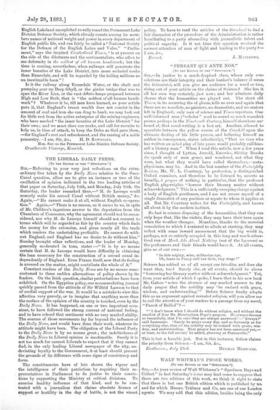" PEREANT QIII ANTE NOS."
[To THE EDITOR OF THE "SPECTATOR."]
SIR,—Tn. justice to a much-despised class, whose only con- solations are their integrity and their banker's balance (I mean the fictionists), will you give me audience for a word or two, rising out of your article on the claims of Science She has it all her own way certainly, just now ; and her admirers daily chorus that the humanities are played out. The stout old Times, in its recurring fits of gloom, tells us ever and agaiu that there are no novelists, no painters, no dramatists, and no orators left in England ; only men of science and Times reporters. One well-informed man ("scholar" used to sound so much rounder) proves perhaps in the Nineteenth Century, himself elsewhere un- heard of, that novel-writing is a lost art. Another, allowed to speculate between the yellow covers of the Cornhil/ upon the ultimate destiny of his little person, and believing himself an author in consequence, states (absolutely), "That DO man who has written an acted play of late years would probably call him- self a literary man." When I read this article, now a few years since, I thought of Lytton, Jerrold, Knowles, Shirley Brooks (to speak only of men gone), and wondered, not what they were, but what they would have called. themselves,—meta- physicians, may be. And in the la'st number of the Fortnightly Review, Mr. W. L. Courtney, by profession, a distinguished
Oxford examiner, and therefore to be listened to, asserts as broadly, a imopos of nothing in particular, that the professed. English playwrights "borrow their literary matter without
acknowledgment." This is a sufficiently sweeping charge against a body of English gentlemen, and I am not aware myself of a single dramatist of any position or repute to whom it applies at all. But Mr. Courtney writes for the Fortnightly, and knows all about it by the modern instiuct.
So fast is science disposing of the humanities, that they can only hope that, like the violets, they may have their turn again when the weather changes. Meantime, thanks to the material consolation to which I ventured to allude at starting, they may reflect with some inward amusement that the big world is, perhaps, not so entirely occupied in this long and much-adver- tised run of Much Ado About Nothing (not of the Lyceum) as the performers and their friends would have it. At all events, give us of our own:—
" In this mighty, wise, utilitarian age,
Oh, leave to Fancy still her little, tiny stage!"
Science has robbed us of all except our frivolity, and does she want that, too ? Surely she, at all events, should be above
"borrowing her literary matter without acknowledgment." Yet, from your article of which I spoke, I learn that in his new book Mr. Galton "notes the absence of any marked answer to the daily prayer that the nobility may 'be endued with grace, wisdom, and understanding.'" Before Science finally adopts this as an argument against revealed religion, will you allow me
to call the attention of your readers to a passage from my novel, "Pancit of Balliol"?—
" I don't know what I should do without religion, and without the comfort of dear Mr. Birmingham Pope's prayers. II e always dresses so beautifully, that I'm sure they are always answered.'—' Always?' said Lestrange. Surely he prays every day, and as fervently as for everything else, that all the nobility may be endued with grace, wis- dom, and understanding. That prayer has not been answered yet,— at least, to the fall extent,' he added, glancing at Pentonville."
This is but a humble jest. But in this instance, fiction claims the priority from Science.—I am, Sir, &c.,


































 Previous page
Previous page